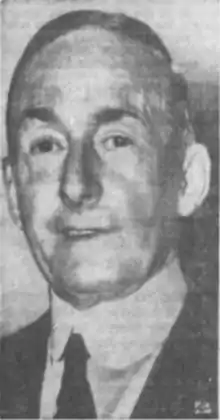David Gray (diplomat)
David Gray (August 8, 1870 – April 11, 1968)[1] was an American playwright and novelist, who served as the United States minister to Ireland from 1940 to 1947.[2]
David Gray | |
|---|---|
 Gray, c. 1940 | |
| United States Envoy to Ireland | |
| In office April 15, 1940 – June 28, 1947 | |
| President | Franklin D. Roosevelt |
| Preceded by | John Cudahy |
| Succeeded by | George A. Garrett |
| Personal details | |
| Born | August 8, 1870 Buffalo, New York |
| Died | April 11, 1968 (aged 97) Sarasota, Florida |
| Nationality | American |
| Spouse(s) | Maude Livingston Hall |
| Alma mater | Harvard University |
| Military service | |
| Allegiance | |
| Branch/service | American Expeditionary Forces |
| Battles/wars | World War I |
Early years
Gray was born in Buffalo, New York, and graduated from Harvard University in 1892.[3] He was a member of the American Expeditionary Forces in World War I; serving in France, he received the Croix de guerre and the Legion of Honour.[1] In 1925, he received a Doctor of Letters from Bowdoin College.[3]
Minister to Ireland
Gray was appointed minister to Ireland in February 1940, and presented his credentials in April 1940.[4] His official title was Envoy Extraordinary and Minister Plenipotentiary.[5]
In Gray's own words, his appointment was nepotic, as he was First Lady's Eleanor Roosevelt's uncle through marriage.[6] Gray was in his post through most of World War II and the start of the Cold War. He led American efforts to convince Ireland to enter the war on the side of the Allies. His performance was such that Ireland's Taoiseach (prime minister) Éamon de Valera sought repeatedly to have Gray replaced, especially after the death of Franklin D. Roosevelt.[6]:543 Gray believed Ireland was only staying neutral because de Valera actually believed the Nazis would eventually defeat the Allies. He also believed that top Irish officials were colluding with Nazi Germany secretly.[7]
Views on Ireland
As a Roosevelt family member, Gray wrote privately to Franklin and Eleanor Roosevelt with a number of dry verses and remarks, sometimes humorous and sometimes scathing, on his opinions of de Valera and Irish policy towards the War.
Since that time there is no record of his having done what was generous or noble or wise, only what he believed served 'the 'Cause'... he regarded himself as 'The Cause'... What was good for de Valera became good for Ireland. There was no honest view other than his... he dedicated himself to justifying his mistakes and making them stand in history as not being mistakes....[6]:544
Senior lecturer in U.S. Foreign Policy, Timothy J. Lynch, has observed that "his animus towards his host nation made Gray atypical of American ambassadors in Dublin."[8]
Gray, among other things, relied for guidance on seances conducted at the embassy residence, according to T. Ryle Dwyer, author of a number of publications on Irish neutrality.[9] During World War II, Gray was completely at odds with the OSS in Ireland. Gray believed the Irish government was secretly pro-Nazi. Gray consistently tried to get Ireland to join the war against the Nazis, though Ireland refused. De Valera went so far as to ask the United States government and Franklin Roosevelt to remove Gray from his post because of opposition to Irish neutrality, though the U.S. government never did.[9]:58
In popular culture
The character of David Gray was played in the 1983 RTÉ television series Caught in a Free State by the actor O. Z. Whitehead.
Later years
Gray donated many of his personal papers to the Franklin D. Roosevelt Presidential Library before his death, including an extensive correspondence. Gray died in Florida in 1968, aged 97.
Works
- Gray, David (1910). Mr. Carteret and Others. The De Vinne Press. ASIN B017ISRDXI.
- Gray, David (1913). Smith: A Novel Based on the Play by W. Somerset Maugham. ISBN 978-1330150948.
- Gray, David (2012). Paul Bew (ed.). A Yankee in de Valera's Ireland: The Memoir of David Gray. Royal Irish Academy. ISBN 978-1908996053.
References
- "Playwright-Novelist Dies". Fort Lauderdale News. Fort Lauderdale, Florida. AP. April 12, 1968. Retrieved April 15, 2017.
- "Chiefs of Mission for Ireland". history.state.gov. Retrieved April 14, 2017.
- "Papers of DAVID GRAY". fdrlibrary.org. Retrieved April 16, 2017.
- "Former U.S. Ambassadors to Ireland". ie.usembassy.gov. Retrieved April 16, 2017.
- "David Gray Jr. (1870–1968)". history.state.gov. Retrieved April 16, 2017.
- Coogan, Tim Pat (1999) [1995]. Eamon De Valera: The Man Who Was Ireland. Barnes & Noble. p. 542. ISBN 0-7607-1251-4.
- http://www.ibtimes.com/irish-nationalist-nazi-when-eamon-de-valera-paid-his-respects-adolf-hitler-1403768
- Lynch, Timothy J. (2004). Turf war: the Clinton administration and Northern Ireland. Ashgate Publishing, Ltd. p. 11. ISBN 978-0-7546-4294-7. Retrieved 2009-07-31.
- Dwyer, T. Ryle (September 3, 2010). Behind the Green Curtain: Ireland's Phoney Neutrality During World War II. Gill & MacMillan. pp. 176–179. ISBN 978-0717146505. Retrieved 2015-04-07.
Further reading
- Hayes, Maurice (August 20, 2012). "Review: David Gray: A Yankee in De Valera's Ireland Edited by Paul Bew". Irish Independent. Retrieved April 22, 2017.
- Dwyer, T. Ryle (2013). "A Yankee in de Valera's Ireland: the memoir of David Gray (review)". History Ireland. Vol. 21 no. 1. Retrieved April 16, 2017 – via historyireland.com.
External links
- David Gray papers at the University of Wyoming - American Heritage Center
- David Gray at Find a Grave
| Diplomatic posts | ||
|---|---|---|
| Preceded by John Cudahy |
United States Envoy to Ireland 1940–1947 |
Succeeded by George A. Garrett |